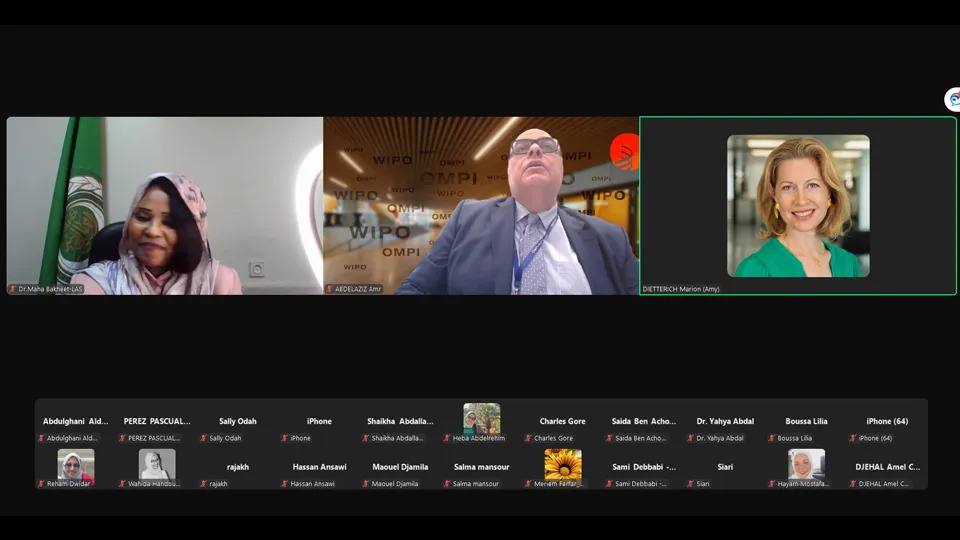IP and Global Health Training Virtual Workshop for the Arab Region
December 20, 2024
The World Intellectual Property Organization (WIPO) hosted a two-day virtual meeting on December 10-11, 2024, bringing together over 40 experts, policymakers, and innovators from the Arab region to discuss the role of intellectual property (IP) in addressing global health challenges.
WIPO partnered with the League of Arab States to organize a training workshop on IP and health issues. The workshop raised awareness on the effective use of IP to foster medical technology innovation and other health topics of interests for Arab Countries.
A diverse group of experts, including representatives from the national IP offices of Algeria, Egypt, Kuwait, Mauritania, Morocco, Palestine, Tunisia, and the United Arab Emirates, participated in the meeting.

Participants focus on IP and public health
Participants discussed the importance of IP in driving innovation and the need for a balance between protecting IP rights and ensuring access to health technologies. Participants also reflected on recent research on health and innovation, the value of voluntary licensing in the biopharmaceutical industry, and the challenges faced by low- and middle-income countries in medical manufacturing.
The meeting covered a wide range of topics, including IP and public health, bio-design incubators, IP for medical manufacturing and technology transfer, and traditional medicine and IP. Experts from the Medicines Patent Pool (MPP) showcased the potential for medical manufacturers in Arab states to benefit from using voluntary licensing to expand access to new treatments in the region and the Indian Department of Biotechnology shared their experience working with universities to develop a new pool of medical device innovators. In addition, WIPO colleagues presented on the use of traditional medicine in the region.
By fostering collaboration and knowledge sharing, this meeting strengthened the capacity of Arab countries to harness IP for addressing pressing global health issues and promoting sustainable development.
WIPO Award winner from Kuwait joined as a resource person
Sarah Aboerjaib, a young medical innovator from Kuwait and the CEO of ScansX, this year’s WIPO Global Awards competition winner, highlighted the role of IP in advancing her MedTech innovation and bringing it to market.
ScansX is a portable, non-invasive medical device that uses near-infrared (NIR) light and artificial intelligence (AI) to detect brain injuries quickly and accurately. ScansX’s IP strategy includes patents across multiple jurisdictions – including the Gulf Cooperation Council (GCC), the United Kingdom, and the United States – to protect its unique integration of NIR and AI technologies.

Sarah also noted that trademarks have supported the protection of ScansX’s brand recognition and trust. Further, the licensing model employed by the firm enables scalability and global reach, fostering adoption by healthcare providers and governments without the need for heavy infrastructure investments.
AMR case study
Antimicrobial resistance (AMR) is a growing health risk in the Arab region. Ms. Maha Bakheet, Director, Legal Affairs Department, Intellectual Property and Competitiveness Department, Economic Sector, League of Arab States, Egypt, highlighted the significance of the Jeddah Commitments on AMR that provides clarity on specific mechanisms and agreements to strengthen global efforts in combating AMR. These commitments underscore the need for a globally coordinated effort to combat AMR; one that addresses human, animal, plant, and environmental health in a One Health framework.
WIPO presented a case study on wastewater technology developed in Qatar to detect AMR across the One Health sectors. The case study showcased how a team of multisectoral experts used quantitative polymerase chain reaction, also known as qPCR, a technology that detects specific genetic material in a sample, to confirm the prevalence of diverse antimicrobial resistant genes in hospital wastewater. Highlighting the importance of innovation and IP protection, the case study also noted the need for further research.
About WIPO’s Global Health Unit
The Global Health Unit at WIPO seeks to raise awareness and understanding of the complex linkages between global health and access to medical technologies, innovation, technology transfer and trade. The goal is to leverage IP as a tool that contributes to meeting the world’s most pressing health needs.
About WIPO’s Department for Development Cooperation
The Department for Development Cooperation, through its Regional Divisions, serves as the bridge between WIPO and its Member States, fostering two-way communication and cooperation. By collaborating with Member States and stakeholders, the Department strengthens capacity and promotes the strategic use of IP for growth and development.